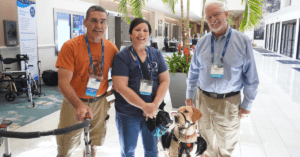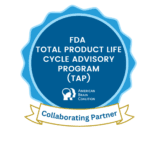Last updated: February 2021
The coronavirus (COVID-19) pandemic is affecting communities worldwide. The health and safety of the Ataxia community is a priority at NAF. We have consulted with our Medical and Research Advisory Board, infectious disease specialists, the World Health Organization, and the Centers for Disease Control and Prevention (CDC) to learn about the best ways that a person with Ataxia can protect themselves during this public health event.
As a result, NAF has taken preventative measures such as recommending cancellation of in-person support group meetings until this situation is under control. Many have opted for virtual meetings instead. Find a meeting at ataxia.org/events.
COVID-19 Vaccines and Ataxia
As vaccinations for COVID-19 are approved, it may create questions for you or your loved ones that have Ataxia. Ataxia patients are at a high risk for respiratory complications and it is therefore recommended that they receive the COVID-19 vaccination after discussion with their physician. Those with Ataxia should be in close consultation with their physician as soon as vaccines are available to them.
Visit the Department of Health and Human Services’ Combat COVID site for information about NIH-supported COVID-19 prevention and treatment clinical trials.
COVID Vaccines and Ataxia Webinar
Should a person with Ataxia receive a COVID vaccine? Do the vaccines affect Ataxia symptoms? This webinar explores the answers to your questions. It was an interactive session with many opportunities to ask Ataxia and virology experts the things you wanted to know.
This webinar was presented by Pravin Khemani, MD, FAAN; Jeremy Schmahmann, MD, FAAN, FANA, FANPA; and Boris Juelg, MD, PhD.
Facts about the COVID-19 Vaccine
Source: Centers for Disease Control and Prevention
- COVID-19 vaccines will not give you COVID-19 – None of the vaccines currently in development in the United States use the live virus that causes COVID-19.
- People who have gotten sick with COVID-19 may still benefit from getting vaccinated – Due to the severe health risks associated with COVID-19 and the fact that re-infection with COVID-19 is possible, people may be advised to get a COVID-19 vaccine even if they have been sick with COVID-19 before.
- Getting vaccinated can help prevent getting sick with COVID-19 – COVID-19 vaccination helps protect you by creating an antibody response without having to experience sickness. Learn more about how COVID-19 vaccines work.
- COVID-19 vaccines will not cause you to test positive on COVID-19 viral tests
COVID-19 and Ataxia Webinar
This webinar was recorded in March 2020. New information has become available since then, including information about newly approved COVID-19 vaccinations. We plan to have an updated webinar offered in January 2021. Check back for updates.
Protect Yourself from Coronavirus
COVID-19 is thought to spread mainly from person-to-person. The best way to prevent illness is to avoid being exposed to the virus. Steps that you can take to limit your risk of exposure are outlined here.
Wash your hands often.
The Centers for Disease Control (CDC) recommends washing your hands with soap and water for at least 20 seconds, especially after visiting a public place, coughing, sneezing, or blowing your nose.
Avoid touching your eyes, nose, and mouth.
The World Health Organization (WHO) warns that your hands can pick up viruses when they touch surfaces. Once your hands are contaminated, touching your eyes, nose, or mouth can transfer the virus into your body. Wearing protective gloves does not protect you from COVID-19. You can still pick up the virus on rubber gloves. Wash your hands well before touching your face.
Maintain distance from others.
The WHO says that you should stay at least 3 feet away from anyone who is coughing or sneezing. It is also recommended to avoid shaking hands to limit your risk of exposure. Greet people with a wave or nod instead.
In addition, the CDC recommends that people at higher risk for complications, such as someone with Ataxia, should take additional preventative actions. These precautions include avoiding crowds and non-essential travel.
If you are at higher risk for complications and COVID-19 is spreading in your community, the CDC recommends that you stay home as much as possible.
Seek medical care early if you develop symptoms.
If you experience fever, cough, or difficulty breathing, call your health care provider immediately. They can tell you the next-steps you should take in your area. According to the CDC, emergency warning signs for adults are:
- Difficulty breathing or shortness of breath
- Persistent pain or pressure in the chest
- New confusion or inability to arouse
- Bluish lips or face
Additional Coronavirus Resources
World Health Organization Resources
- Coronavirus Disease (COVID-19) Outbreak
- Basic Protective Measures Against the New Coronavirus
- Myth Busters About Coronavirus
- Travel Advice During Coronavirus Outbreak
The Centers for Disease Control and Prevention Resources
- Coronavirus Disease (COVID-19)
- Steps to Prevent Coronavirus Illness
- Extra Precautions for People with Chronic Diseases at Higher Risk
- What to Do if You Are Sick
- How to Manage and Monitor Symptoms at Home
- Caring for Someone at Home
Department of Health & Human Services
U.S. Department of State Resources
COVID Vaccinations
- Benefits of Getting a COVID-19 Vaccine (Source: CDC)
- COVID-19 Vaccines (Source: CDC)
- Information on COVID-19 and Friedreich’s Ataxia (Source: FARA)
For Clinicians Treating an Ataxia Patient
- Management of Patients with Cerebellar Ataxia During the COVID-19 Pandemic: Current Concerns and Future Implications (links to PDF) (Source: The Cerebellum)
For a Person Diagnosed with Coronavirus
- RAREwithCOVID – A registry for those with a rare disease and COVID-19
For Caregivers of a Person Diagnosed with Coronavirus
- Guide for Household Members, Intimate Partners, and Caregivers (links to PDF) (Source: National Association for Home Care & Hospice)
- Caregivers – Having a Back-Up Plan in Case You Get Sick (Source: University of California San Francisco)
Home Health Care
- Tips on Hygiene for Reducing Infection (links to PDF)
- How to Prepare for Your Telehealth Appointment (links to PDF) (Source: NORD)
- Telehealth Visits
- Health Insurance
Mental Health: Stay Connected!
- Virtual Ataxia Support Group Meetings
- Educational Webinars
- Social Services
- National Suicide Prevention Hotline: 1-800-273-8255
Staying Active
















